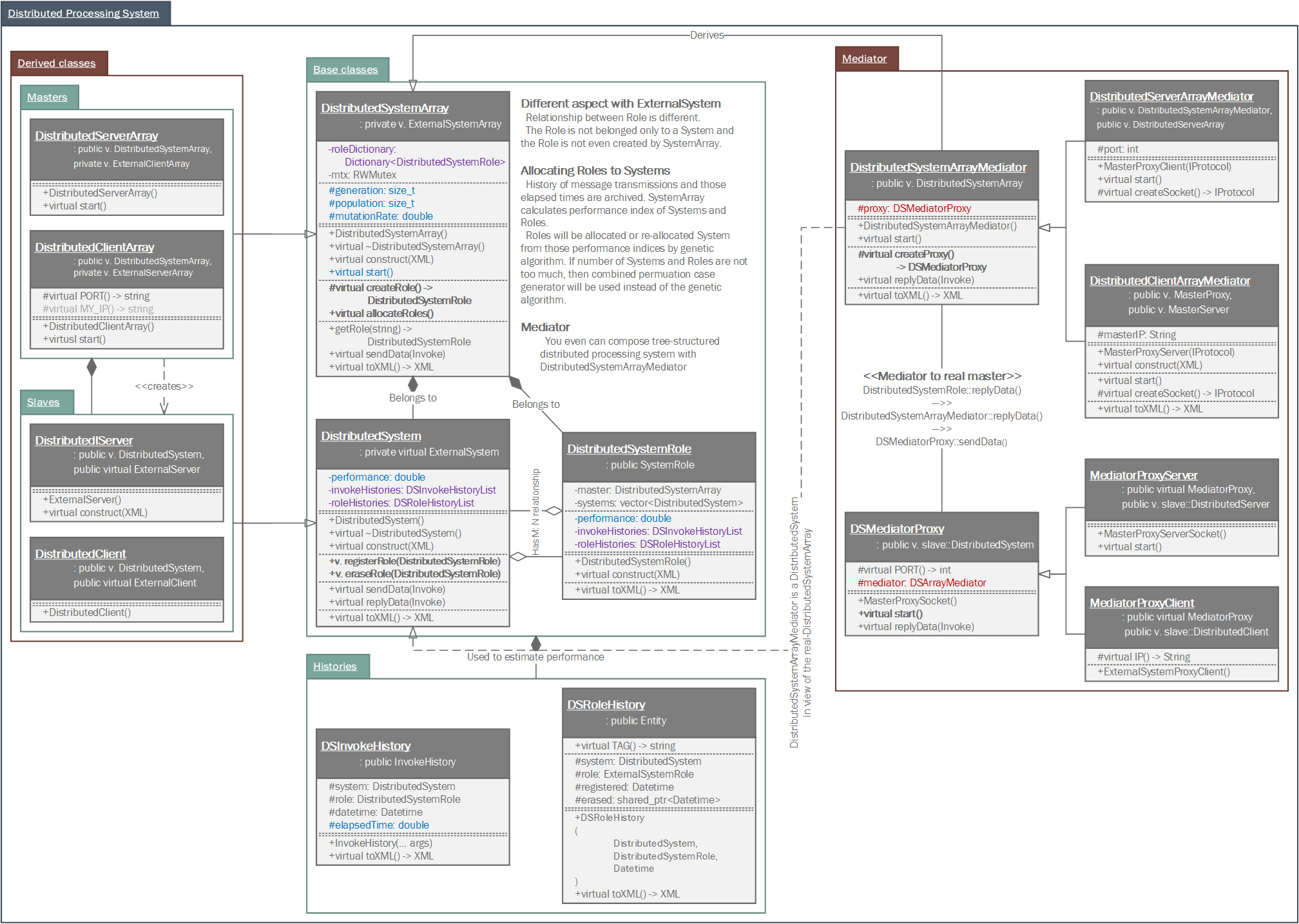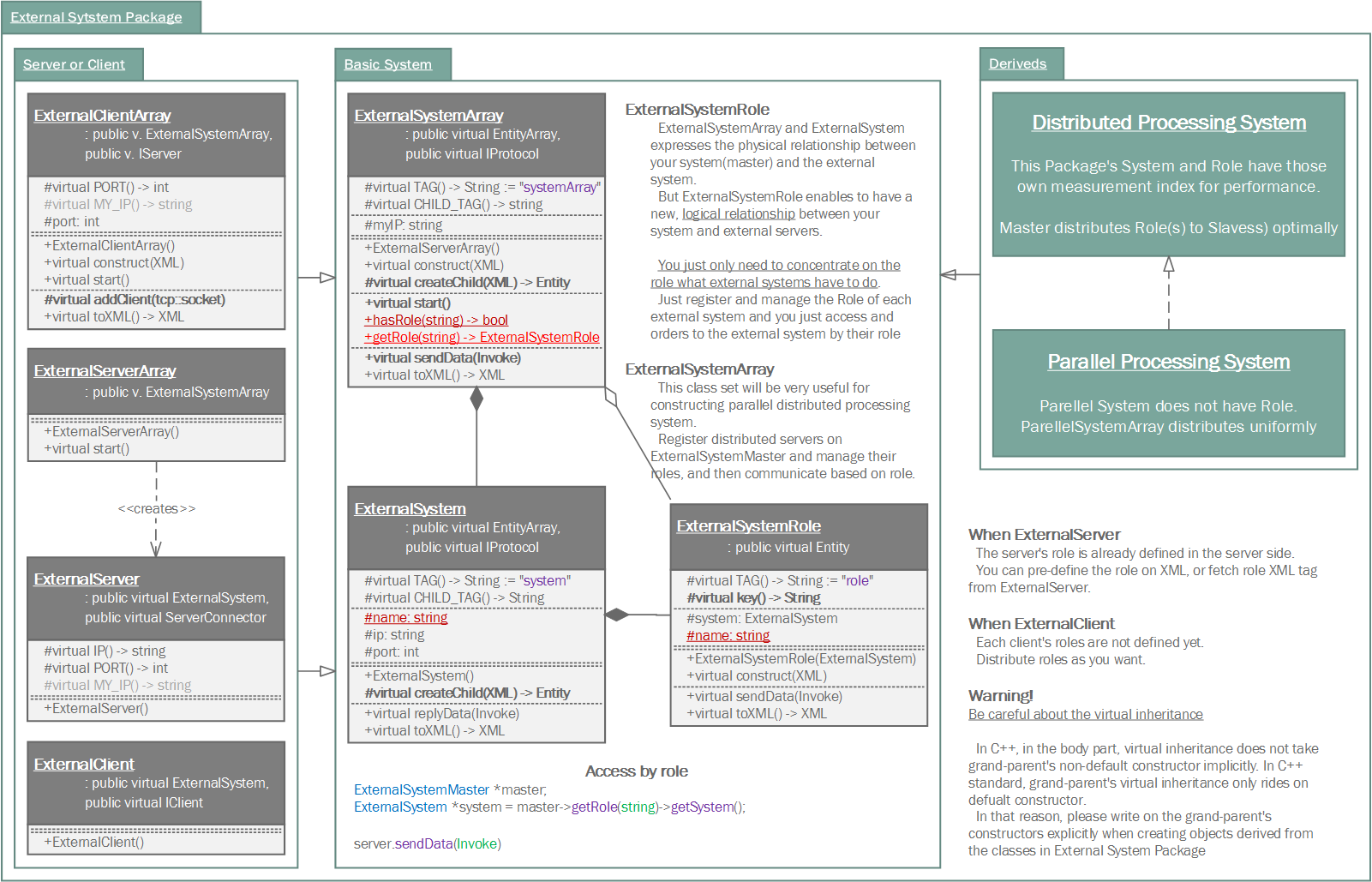|
Samchon Framework for CPP
1.0.0
|
|
Samchon Framework for CPP
1.0.0
|
A network driver for a distributed server. More...
#include <DistributedServer.hpp>

Public Member Functions | |
| DistributedServer () | |
| Default Constructor. More... | |
| virtual void | construct (std::shared_ptr< library::XML >) override |
| Construct data of the Entity from an XML object. More... | |
| virtual auto | toXML () const -> std::shared_ptr< library::XML > override |
| Get an XML object represents the EntityGroup. More... | |
 Public Member Functions inherited from samchon::protocol::master::DistributedSystem Public Member Functions inherited from samchon::protocol::master::DistributedSystem | |
| DistributedSystem () | |
| Default Constructor. More... | |
| virtual void | sendData (std::shared_ptr< Invoke >) override |
| Sends message to a related system. More... | |
| virtual void | replyData (std::shared_ptr< Invoke >) override |
| Handling replied message from an external system. More... | |
 Public Member Functions inherited from samchon::protocol::ExternalSystem Public Member Functions inherited from samchon::protocol::ExternalSystem | |
| ExternalSystem () | |
| Default Constructor. More... | |
| virtual auto | key () const -> std::string override |
| Get a key that can identify the Entity uniquely. More... | |
| virtual auto | TAG () const -> std::string override |
| A tag name when represented by XML. More... | |
| virtual auto | CHILD_TAG () const -> std::string override |
| A tag name of children. More... | |
 Public Member Functions inherited from samchon::protocol::EntityGroup< _Container, _ETy, T > Public Member Functions inherited from samchon::protocol::EntityGroup< _Container, _ETy, T > | |
| EntityGroup () | |
| Default Constructor. More... | |
| auto | has (const std::string &key) const -> bool |
| Indicates whether a container has an object having the specified identifier. More... | |
| auto | get (const std::string &key) -> value_type & |
| Access the element by specified identifier(key). More... | |
| auto | get (const std::string &key) const -> const value_type & |
| Access the const element by specified identifier(key). More... | |
 Public Member Functions inherited from samchon::protocol::Entity Public Member Functions inherited from samchon::protocol::Entity | |
| Entity () | |
| Default Constructor. More... | |
 Public Member Functions inherited from samchon::protocol::IEntityGroup Public Member Functions inherited from samchon::protocol::IEntityGroup | |
| IEntityGroup () | |
| Default Constructor. More... | |
 Public Member Functions inherited from samchon::protocol::IClient Public Member Functions inherited from samchon::protocol::IClient | |
| IClient () | |
| Default Constructor. More... | |
| virtual void | listen () |
| Listens message from a related system. More... | |
 Public Member Functions inherited from samchon::protocol::IProtocol Public Member Functions inherited from samchon::protocol::IProtocol | |
| IProtocol () | |
| Default Constructor. More... | |
 Public Member Functions inherited from samchon::protocol::ExternalServer Public Member Functions inherited from samchon::protocol::ExternalServer | |
| ExternalServer () | |
| Default Constructor. More... | |
| virtual void | start () override |
| Start interaction. More... | |
| virtual auto | getIP () const -> std::string override |
| Destinatio IP. More... | |
| virtual auto | getPort () const -> int override |
| Destination port. More... | |
| virtual auto | getMyIP () const -> std::string override |
| (optional) My IP, if you want to bind More... | |
 Public Member Functions inherited from samchon::protocol::ServerConnector Public Member Functions inherited from samchon::protocol::ServerConnector | |
| ServerConnector () | |
| Default Constructor. More... | |
| virtual void | connect () |
| Connect to a server. More... | |
Additional Inherited Members | |
 Protected Member Functions inherited from samchon::protocol::master::DistributedSystem Protected Member Functions inherited from samchon::protocol::master::DistributedSystem | |
| virtual auto | createChild (std::shared_ptr< library::XML >) -> ExternalSystemRole *override |
| Factory method of a child Entity. More... | |
 Protected Member Functions inherited from samchon::protocol::IClient Protected Member Functions inherited from samchon::protocol::IClient | |
| virtual auto | BUFFER_SIZE () const -> size_t |
| Buffer size of network I/O. More... | |
| virtual void | _replyData (std::shared_ptr< Invoke >) |
| A method for pre-processing replied Invoke message. More... | |
 Protected Attributes inherited from samchon::protocol::master::DistributedSystem Protected Attributes inherited from samchon::protocol::master::DistributedSystem | |
| size_t | inProgress |
| A number of processes running on the distributed system. More... | |
| size_t | processed |
| A number of processed have runned. More... | |
| double | avgElapsedTime |
| Average of elapsed time. More... | |
| double | performance |
| A performance index. More... | |
| DSRoleHistoryList * | roleHistoryList |
| A list of history log for role allocations. More... | |
| DSInvokeHistoryArray * | invokeHistoryArray |
| A list of history log for reported Invoke messages. More... | |
 Protected Attributes inherited from samchon::protocol::ExternalSystem Protected Attributes inherited from samchon::protocol::ExternalSystem | |
| std::string | name |
| A name can identify an external system. More... | |
| std::string | ip |
| An ip address of an external system. More... | |
| int | port |
| A port number of an external system. More... | |
 Protected Attributes inherited from samchon::protocol::IClient Protected Attributes inherited from samchon::protocol::IClient | |
| Socket * | socket |
| Socket for network I/O. More... | |
| std::mutex * | sendMtx |
| A mutex for sending message. More... | |
 Protected Attributes inherited from samchon::protocol::ExternalServer Protected Attributes inherited from samchon::protocol::ExternalServer | |
| std::string | myIP |
| A custom ip address of my system to bind. More... | |
 Protected Attributes inherited from samchon::protocol::ServerConnector Protected Attributes inherited from samchon::protocol::ServerConnector | |
| boost::asio::io_service * | ioService |
| An io_service of Boost.Asio's own. More... | |
| EndPoint * | endPoint |
| An endpoint directing a server. More... | |
| EndPoint * | localEndPoint |
| (Optional) An local endpoint of the client (my system) More... | |
A network driver for a distributed server.
DistributedServer is an DistributedSystem specialized in server driver.
DistributedSystem class is an ExternalSystem having role as DistributedSystemRole objects with performance index and history log allocation of DistributedSystemRole objects and have requsted Invoke message to related external system.
The greatest difference between DistributedSystem and ExternalSystem is, unlike the ExternalSystem class which having is ExternalSystemRole objects exclusively, DistributedSystem does not monopoly a DistributedSystemRole. The DistributedSystemRole can allocatedto multiple DistributedSystem.
DistributedSystem and DistributedSystemRole classes have performance index and history log archiving what they've requested to the related distributed system. Allocating DistributedSystemRole objects to DistributedSyste will be determined those performance index and history log for optimize distribution of elasped time about each Invoke message processing.

ExternalSystem is a boundary class interacting with an external system by network communication. Also, ExternalSystem is an abstract class that a network role, which one is server and which one is client, is not determined yet.
The ExternalSystem has ExternalSystemRole(s) groupped methods, handling Invoke message interacting with the external system, by subject or unit of a moudle. The ExternalSystemRole is categorized in a 'control'.

The ExternalSystem class takes a role of interaction with external system in network level. However, within a framework of Samchon Framework, a boundary class like the ExternalSystem is not such important. You can find some evidence in a relationship between ExternalSystemArray, ExternalSystem and ExternalSystemRole.
Of course, the ExternalSystemRole is belonged to an ExternalSystem. However, if you access an ExternalSystemRole from an ExternalSystemArray directly, not passing by a belonged ExternalSystem, and send an Invoke message even you're not knowing which ExternalSystem is related in, it's called "Proxy pattern".
Like the explanation of "Proxy pattern", you can utilize an ExternalSystemRole as a proxy of an ExternalSystem. With the pattern, you can only concentrate on ExternalSystemRole itself, what to do with Invoke message, irrespective of the ExternalSystemRole is belonged to which ExternalSystem.
Definition at line 22 of file DistributedServer.hpp.
| samchon::protocol::master::DistributedServer::DistributedServer | ( | ) |
Default Constructor.
|
overridevirtual |
Construct data of the Entity from an XML object.
Constructs the EntityGroup's own member variables only from the input XML object.
Do not consider about constructing children Entity objects' data in EntityGroup::construct(). Those children Entity objects' data will constructed by their own construct() method. Even insertion of XML objects representing children are done by abstract method of EntityGroup::toXML().
Constructs only data of EntityGroup's own.
Overrides the construct() method and fetch data of member variables from the XML.
By recommended guidance, data representing member variables are contained in properties of the put XML object.
| xml | An xml used to construct data of entity |
Reimplemented from samchon::protocol::ExternalServer.
|
overridevirtual |
Get an XML object represents the EntityGroup.
Archives the EntityGroup's own member variables only to the returned XML object.
Do not consider about archiving children Entity objects' data in EntityGroup::toXML(). Those children Entity objects will converted to XML object by their own toXML() method. The insertion of XML objects representing children are done by abstract method of EntityGroup::toXML().
Archives only data of EntityGroup's own.
Returns an XML object that can represents the Entity containing member variables into properties.
A member variable (not object, but atomic value like number, string or date) is categorized as a property within the framework of entity side. Thus, when overriding a toXML() method and archiving member variables to an XML object to return, puts each variable to be a property belongs to only an XML object.
Don't archive the member variable of atomic value to XML::value causing enormouse creation of XML objects to number of member variables. An Entity must be represented by only an XML instance (tag).
| Standard Usage | Non-standard usage abusing value |
|---|---|
| <memberList> <member id='jhnam88' name='Jeongho+Nam' birthdate='1988-03-11' /> <member id='master' name='Administartor' birthdate='2011-07-28' /> </memberList> | <member> <id>jhnam88</id> <name>Jeongho+Nam</name> <birthdate>1988-03-11</birthdate> </member> |
Reimplemented from samchon::protocol::ExternalServer.